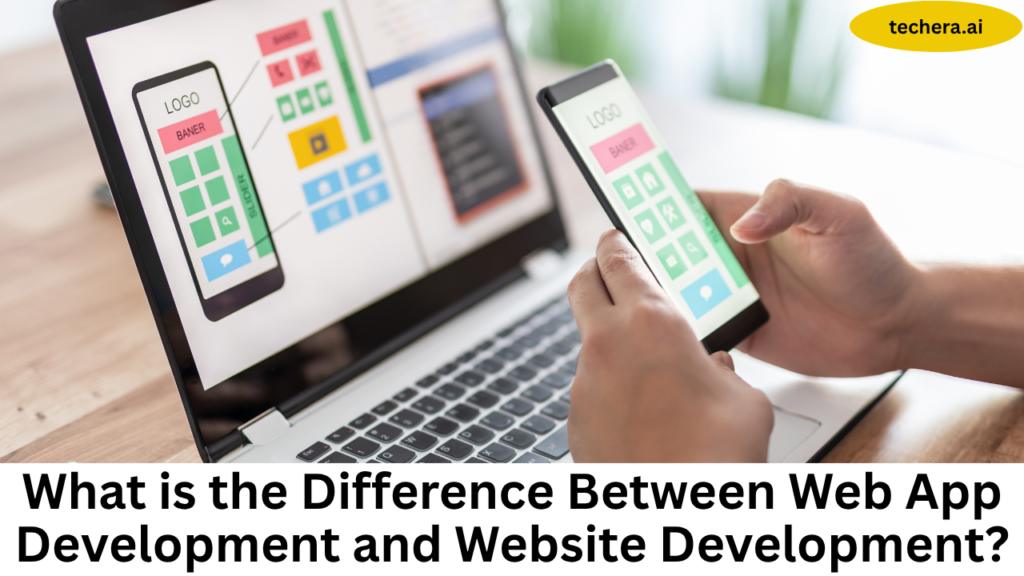
Discover the key differences between Web App Development and website development in this informative blog post. Learn how functionality, user interaction, and development approaches set them apart, helping you choose the right solution for your business needs.
Introduction
An online presence becomes essential in today’s fast-paced digital environment. Whether you’re a small business, a startup, or a large enterprise, you’ll often find yourself needing either a website or a web application. But wait—aren’t they the same thing? Actually, no. While they may look alike on the surface, websites and web apps serve different purposes, require different development strategies, and cater to different user needs.
Let’s break it all down and make sense of the key differences between web app development and website development.
Understanding the Basics
What is a Website?
A website is a collection of publicly accessible, interlinked web pages hosted under a single domain. Think of it like a digital brochure or an online storefront. Websites are generally informational and don’t require much user interaction beyond clicking and scrolling.
Example: A company’s homepage, a blog, or an online portfolio.
What is a Web Application?
A web application, on the other hand, is interactive software that runs on a web browser. It’s designed for user engagement—users log in, submit data, perform tasks, and receive dynamic feedback.
Example: Facebook, Google Docs, or any online banking system.
Key Characteristics
Characteristics of a Website
- Primarily static content
- One-way communication (business to user)
- Rarely requires authentication
- Easier to build and maintain
Characteristics of a Web App
- Highly interactive
- Two-way communication (user input and output)
- Requires user authentication
- Dynamic content rendered based on user behavior
Core Differences Between Website and Web App Development

Purpose and Functionality
Websites serve to inform. Their purpose is usually to present content like articles, services, contact details, or visual branding.
Web apps are meant to engage. They are tools that allow users to do something—whether that’s managing tasks, shopping online, or communicating.
Also Read : The Role of Web App Development in Enhancing Data Analytics and Insights
User Interaction
Websites are passive: You read, watch, or scroll.
Web apps are active: You log in, fill out forms, upload files, and expect a response.
Level of Complexity
Website development is relatively simple—design a few pages, plug in content, and you’re good.
Web app development is more complex and involves logic, data flow, state management, and often integrations with other services or databases.
Development Process
Website development often includes:
- Wireframing
- Front-end coding (HTML, CSS, JavaScript)
- CMS setup (like WordPress)
Web app development includes:
- UI/UX design
- Front-end and back-end coding
- Database management
- API integrations
- QA testing
Hosting and Deployment
Websites can be hosted on shared servers or platforms like Wix, Squarespace, or WordPress.
Web apps typically require cloud hosting, load balancers, and possibly microservices architecture for scalability.
Technology Stack
Websites use simple stacks:
- HTML, CSS, JavaScript
- CMS (WordPress, Joomla)
Web apps use modern, complex stacks:
- Frontend: React, Angular, Vue
- Backend: Node.js, Django, Ruby on Rails
- Database: MongoDB, MySQL, PostgreSQL
Design and User Experience for Website and Web App Development

Website UI/UX Focus
Focus is on clean design and intuitive navigation. A good website anticipates what the visitor wants and makes it easy to find.
Web App UI/UX Focus
Focus is on usability and workflow efficiency. Think dashboards, live updates, drag-and-drop functionality—these need seamless and error-free interactions.
Performance and Speed
Speed Considerations for Websites
Speed is vital for SEO and user retention. Lightweight frameworks and image optimizations are key.
Performance Metrics for Web Apps
Web apps need to manage real-time updates, background processing, and large datasets. Performance tuning involves database queries, API load times, and client-server communication.
Security Factors
Website Security Basics
- SSL encryption
- Captcha to avoid spam
- Basic user protection
Web App Security Challenges
- Authentication and Authorization
- Data encryption
- Cross-site scripting (XSS)
- SQL injection protection
Maintenance and Scalability
How Websites Scale
Scaling a website is often as simple as upgrading your hosting plan or using a CDN.
Web App Maintenance Complexities
Web apps need continuous monitoring, version control, patch updates, and performance optimization.
Cost and Time Investment
Development Time
Website: Takes a few days to weeks, depending on how complicated it is.
Web App: Could take months or longer due to testing, iterations, and feature-rich development.
Budget Differences
Websites are budget-friendly, especially with templates and CMS tools.
Web apps are expensive due to custom coding, maintenance, and infrastructure.
Examples and Use Cases
Website Use Cases
- Personal blog
- Business homepage
- Portfolio
- News site
Web App Use Cases
- Online banking
- Project management tools (like Trello)
- Social media platforms
- E-commerce dashboards
Which One Do You Need?
Your objectives will determine whether you should use a web app or a website.
If you need to showcase content, go for a website.
If you need to solve problems or enable tasks, go for a web app.
Ask yourself:
- Do users need to interact?
- Will you handle sensitive data?
- Are real-time features required?
Your responses will help you make the right decisions.
Conclusion
So, while websites and Web app development may seem similar at first glance—they’re worlds apart in terms of purpose, complexity, and functionality. A website is your digital handshake; a web app is your digital service.
Whether you’re building brand awareness or solving complex problems for users, understanding the difference can save you time, money, and a lot of headaches.
Frequently Asked Question
Q. What are examples of web applications?
A. Examples include Google Docs, Slack, Trello, Zoom, and online banking portals.
Q. Is every website a web app?
A. No. While all web apps are accessible via browsers like websites, not all websites offer the interactivity and logic-driven functions of web apps.
Q. Which is better for SEO: website or web app?
A. Websites are generally better for SEO since they offer crawlable content, clean URLs, and quick load times. Web apps often need special setups for SEO optimization.
Q. Can a web app replace a mobile app?
A. Sometimes. Progressive Web Apps (PWAs) can mimic mobile apps well, but they still can’t access all device hardware like native apps can.
Q. How do you convert a website into a web app?
A. You’ll need to integrate client-server communication, user authentication, and dynamic functionalities using JavaScript frameworks and backend technologies.

